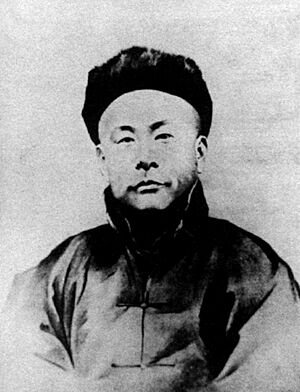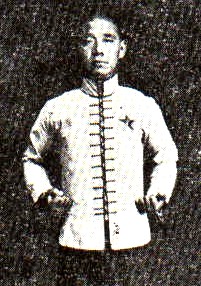Huo Yuanjia facts for kids
Quick facts for kids Huo Yuanjia |
|||||||||||||
|---|---|---|---|---|---|---|---|---|---|---|---|---|---|
 |
|||||||||||||
| Born | 18 January 1868 Jinghai County, Tianjin, Qing dynasty |
||||||||||||
| Died | 9 August 1910 (aged 42) Shanghai, Qing dynasty |
||||||||||||
| Style | Wushu Mizongyi |
||||||||||||
| Teacher(s) | Chen Seng-ho Huo Endi |
||||||||||||
| Occupation | Martial artist | ||||||||||||
| Spouse |
Ms. Wang
(before 1910) |
||||||||||||
| Children | 5 | ||||||||||||
| Notable relatives | Huo Endi (father) | ||||||||||||
| Notable club(s) | Chin Woo Athletic Association | ||||||||||||
| Chinese name | |||||||||||||
| Chinese | 霍元甲 | ||||||||||||
|
|||||||||||||
| Junqing (courtesy name) |
|||||||||||||
| Chinese | 俊卿 | ||||||||||||
|
|||||||||||||
Huo Yuanjia (born January 18, 1868 – died August 9, 1910) was a famous Chinese martial artist. He helped start the Chin Woo Athletic Association, a special school for martial arts in Shanghai. Huo was a master of a martial art style called mizongyi. Many people in China see him as a hero. He became famous for winning fights against foreign challengers. This happened at a time when China was facing many challenges from other countries. Because he was such a hero, it's sometimes hard to tell the real facts from the exciting stories about his life.
Contents
Early Life and Training
Huo Yuanjia was born in a village called Xiaonanhe, near Tianjin, China. He was the fourth of ten children in his family. His family mainly farmed, but his father, Huo Endi, also worked as a guard for merchant groups traveling to Manchuria.
Even though his family was known for practicing wushu, Huo was often sick when he was young. He had asthma and a condition called jaundice, which made him feel unwell often. Because he was not very strong, his father didn't want him to learn wushu.
Instead, Huo's father hired a teacher named Chen Seng-ho to teach him school subjects and good values. In return, Chen learned the Huo family's special martial arts style, mizongyi. But Huo still really wanted to learn wushu. He watched his father teach other students during the day. Then, he secretly practiced at night with Chen.
In 1890, a martial artist from another area visited the Huo family. He fought Huo's older brother, and his brother lost. To everyone's surprise, Huo stepped up and fought the visitor, winning the match! This showed his family that he was strong enough to practice wushu. After that, his father finally let him become a student. As Huo grew older, he challenged other martial artists and became more and more famous for winning.
Huo later joined his father in guarding caravans. One day, while protecting some monks, they were stopped by bandits. Huo bravely fought the bandit leader and defeated him. News of this brave act spread, making him even more well-known. In 1896, Huo moved to Tianjin. There, he worked as a porter, carrying goods at a pharmacy, and also sold firewood.
Becoming Famous
In 1902, a Russian wrestler in Tianjin put out a challenge. He said that Chinese people were "sick men of Asia" because no one would fight him. Huo Yuanjia accepted the challenge. When the Russian wrestler met Huo, he gave up right away. He told Huo that he was just putting on a show to earn money and said sorry for what he had written.
Later, between 1909 and 1910, Huo went to Shanghai twice. He went to accept a challenge from an Irish boxer named Hercules O'Brien. They argued about the rules for their boxing match. Finally, they agreed that the first person to knock down their opponent would win. It is said that O'Brien fought Huo and lost. Huo's victory was a huge inspiration for the Chinese people. It made them question the idea that foreign powers were stronger. However, some people debate whether this fight actually happened. One recent story says that O'Brien decided to leave town instead.
Chin Woo Athletic Association
Around 1909 and 1910, Huo started the Chin Woo Physical Training Centre. This place was later renamed the "Chin Woo Athletic Association". He started it with his good friend Nong Jinsun, who became the president. Huo's friends encouraged him, and important people like Sun Yat-sen helped him with money. The center was created to teach self-defense, improve health, and strengthen the mind.
Huo was not well; he suffered from jaundice and another illness. He started seeing a Japanese doctor for medicine and treatment. This doctor, who was part of a Japanese Judo group in Shanghai, invited Huo to a competition. Huo's student, Liu Zhensheng, competed against a judo fighter. There were disagreements about who won the match. Both sides generally agreed that the argument turned into a fight. Members of the judo team, including their main instructor, were hurt. Some even had broken fingers and hands.
Huo Yuanjia's Death
Huo Yuanjia passed away in 1910 when he was 42 years old. He left behind his wife, Ms. Wang, two sons (Huo Dongzhang and Huo Dongge), and three daughters.
A historian named Chen Gongzhe, who was also one of Huo's students, believed that Huo died from coughing up blood. Chen wrote that as Huo's health got worse, the judo instructor introduced him to a Japanese doctor. The doctor gave Huo some medicine. But Huo's health kept getting worse. He was taken to the Shanghai Red Cross Hospital, where he died two weeks later.
Chen did not say that the medicine from the Japanese doctor contained poison. However, some leaders of the Chin Woo Athletic Association thought that Huo might have been poisoned around the time he died. They believed that the Japanese were jealous of his fame and his martial arts skills.
In 1989, Huo's grave was opened, and his remains were moved. Dark spots were found in his hip bones. A police lab in Tianjin confirmed that these spots contained arsenic. It's hard to know for sure if Huo died because of poisoning or from the medicine he was given. This is because arsenic trioxide has been used as a medicine in traditional Chinese medicine for a very long time.
Huo Yuanjia's Legacy
Huo Yuanjia died just a few months after helping to start the Chin Woo Athletic Association. Before he passed away, he invited Zhao Lianhe, a master of the Shaolin Mizong style, to teach at Chin Woo. Zhao agreed. After that, many other famous martial arts masters also agreed to teach at the school. These included Chen Zizheng, a master of Eagle Claw, Luo Guangyu, a master of Seven Star Praying Mantis, Geng Xiaguang, a master of Xingyiquan, and Wu Jianquan, who created Wu-style taijiquan.
In June 1910, a newspaper called the Eastern Times announced that the Chin Woo association had been officially started in Huo's name. It was the first martial arts organization in China that was open to everyone and not linked to just one specific martial arts family or style.
See also
 In Spanish: Huo Yuanjia para niños
In Spanish: Huo Yuanjia para niños


